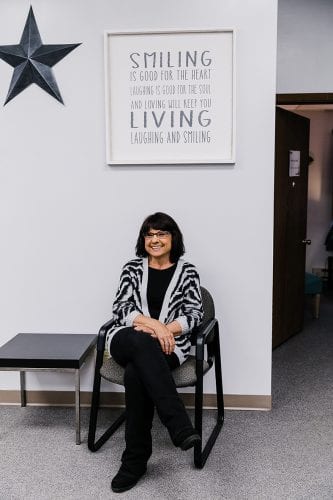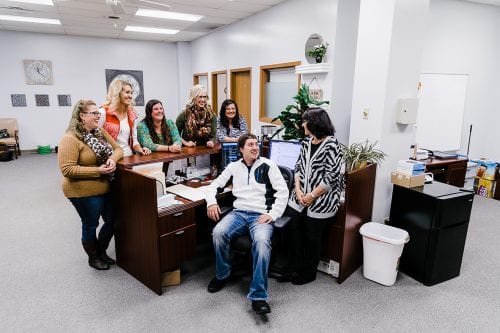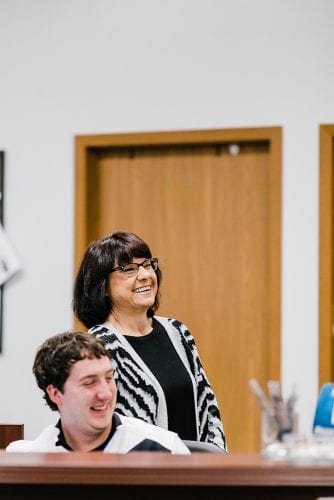By Marci Narum
Photography: Photos by Jacy
In April 2015, Brenda Owen started her own counseling agency in Williston, North Dakota. It was just her; she offered therapy sessions part time from a one-room suite. Brenda says she never wanted to own a business; her main ambition was to help people recover from addictions or abuse that held them back from meaningful and purposeful lives. Her own life had given her reason: Brenda witnessed the devastating impacts of abuse and addiction starting in childhood.
“I grew up in a horribly violent, alcoholic home,” Brenda shares. “It was nice to see my dad go into recovery; I developed a really good relationship with him before his death.”
It was difficult watching someone she loved struggle with addiction, but Brenda says recovery is also very hard.
“My husband went through some real tragic times with his addiction. He ended up in the hospital on IVs to overcome that. He’s been sober five years.”
Brenda says she knows how addiction, abuse, and mental health issues affect families and partners, but she also believes, “God can turn a man’s life around.” She became a social worker and licensed addiction counselor to be God’s hands and feet, to be part of that transformation clients experience in recovery. Brenda says clients succeed when they learn to accept — even love — themselves so they can face the pain, begin to heal, and make changes that result in better decisions and relationships.
The transformations are frequent, and Brenda shares an example of one client, who struggled with very compulsive behaviors triggered by her belief that she wasn’t accepted socially or even by her own family.
“She was stuck and was struggling in almost every aspect of her life, becoming a social outcast, drawing the attention of others, and her life circle was getting smaller and smaller. People were angry with her because she just couldn’t get out of her cycle of dysfunction. One day, someone told her she was beautiful. She rejected this idea on the surface, but it appears she didn’t reject it internally. She began to take care of herself,” Brenda says.

She became a social worker and licensed addiction counselor to be God’s hands and feet, to be part of that transformation clients experience in recovery.
Brenda says the woman began wearing flattering clothes, eating healthier food, and exercising, which made her feel better.
“She began taking time to read things that were important to her and she began to look to emotionally-healthy people that made her feel good inside instead of those that would make her feel bad,” Brenda says.
MEETING CLIENT NEEDS
Summit has grown rapidly and Brenda is no longer the only staff member. In four years, the not-for-profit agency has expanded to 34 employees in seven additional North Dakota communities: Watford City, Dickinson, Tioga, Mohall, Carson, Bismarck, and the Prairie Learning Center near Raleigh. Summit Counseling specializes in therapeutic services for mental health and substance use and serves children, adolescents, adults, individuals, couples, and families. The agency serves about 1,500 clients each month, and Brenda says each client will directly impact the lives of five to 11 people.
The agency has grown as a result of Brenda’s philosophy of helping people where they are. Her way of thinking is not if it can be done, but how it will be done.
“We don’t fit inside the box,” Brenda explains. “Summit has boundaries, it’s just that those boundaries are like a rubber band. Where’s the need? Yes, we can do that.
“We opened an office at Prairie Learning Center and we’re renting a space from them so we can better serve their clients and afford to serve them with reimbursements. It may not be a long-term solution, but it’s a need, so we’re transporting staff down there,” Brenda says.

Brenda (right) with her Summit Counseling staff in Bismarck (L to R): Jennie Cornell, Anna Weisbeck, Amanda Frank, Kaitlyn Weigel, Angela Wolff, and Taren Staudinger
“We collaborate with schools, we’re doing professional development for educators, we go to law enforcement centers and jails and do evals. We’ve had a request for adolescent services, so we’ve become licensed for adolescents with our addiction services. We really try to meet the need if we can.”
MEETING COMMUNITY NEEDS
Brenda says the expansion to other communities is in response to therapists and counselors having a need, too — to stay close to home and family.
“That’s where some of our community clinics came from,” Brenda explains. “We’d plant an office because the therapist had a heart for that region … we have a therapist who did an internship in Williston who’s from Deering, north of Minot. She was instrumental in opening up the Mohall office.”
Summit Counseling expanded into Carson and Bismarck in the same way. In fact, Angela Wolff of Bismarck was serving her internship with a colleague from her hometown of Carson when she heard about Summit Counseling.
“Hearing about how Summit is (based) in Williston and has a little office in Watford, and they’re reaching out to Tioga, I said, ‘Josh, we really should check this out!’ I thought it might really align with what he’s thinking because he wants to serve smaller communities, he’s not wanting to move, he wants to be where his family is,” Angela says.
“When I said, ‘Brenda, I’m really interested in what you’re doing,’ I remember her saying to me, ‘So, what you’re telling me, is Bismarck needs Summit Counseling.’ Yes! That’s it! It didn’t dawn on me until she made that statement,” Angela recalls.
Josh is a licensed master social worker at the Carson office, which opened in July 2018, as did the Bismarck office, where Angela serves as a licensed associate professional counselor specializing in multiple areas including anxiety and depression, topics most people don’t want to discuss.
“I really have a passion for changing that,” Angela says. “This is really how it should be: we get our eyes checked, we go to the dentist. It’s OK to say, ‘I’m having concerns with depression and I don’t know what to do.’”

“…for some clients, self-care is a therapy session…”
HELP YOURSELF
Mental health is an element of self-care. Accepting mental health issues as part of the human experience is key to being OK with these conversations.
“Self-care feels selfish, but it’s exactly the opposite,” Brenda says. “It is being the best we can be. If we continually give, we have no reserves to give to others. Eventually we burn out or begin making poor decisions, or emotional problems surface. We become dissatisfied with life, turn to others and things to fill our tanks — alcohol, affairs, overeating, or just isolating because we are not fulfilled by the things we think fill us up.
“The spiritual aspect, in my opinion, is the optimal self-care — getting to know our own value and who we really are. If we really understood our value, we would never treat ourselves in the manner we do or allow others to treat us the way they often do,” she says.
Brenda says we are instructed to take care of ourselves, pointing to the second part of The Greatest Commandment, referenced throughout the Bible.
“You shall love the Lord your God with all your heart, and with all your soul, and with all your mind.’ This is the greatest and first commandment. And a second is like it: ‘You shall love your neighbor as yourself.” (Mark 12: 29 – 31)
Love your neighbor as yourself.
“Self-care is more than just a day at the spa or time out for shopping. It’s much deeper than that. It’s truly refreshing the spirit and soul. It means healing, recognizing value, and being OK with who God made us (to be) without having to feel like we have to work for His love,” Brenda says.
ROUTINE CONVERSATION
Brenda says self-care is always part of the conversation with clients and staff at Summit.
“It may not be phrased as such, but it is about learning to love self, taking care of self, having appropriate relationships, developing a balance in life,” she says. “We see this development of learning to love self in almost every client, in some form; loving ourselves enough to set appropriate boundaries, understanding that it’s ok to love ourselves, and take care of ourselves. This may mean saying no, setting boundaries, learning to communicate effectively, taking time for ourselves, and learning how to fill our own emotional tanks.”
She says for some clients, self-care is a therapy session.
“If you sat in the lobby, you would see a noticeable difference in the countenance between when they went into the therapy and when they came out,” Brenda says. “There is hope and someone to travel that road with them. They are not alone. They are validated, understood, and encouraged.”
THE RESULTS
Someone walked that road with the client who struggled with compulsive behaviors and false beliefs that her family and others rejected her.
“Her compulsions are not evident. She is composed, smiles a lot, sets healthy boundaries for herself and others around her, and she can say no without feeling guilty or having to get angry first,” Brenda says. “She is OK with those who reject her, as she has healthy people speaking into her spirit.”
Rejecting the notion that we need help is the opposite of self-care, and Brenda says sometimes the most difficult thing for a client is working through the fear of going to the first therapy session.
“The fear is by far worse than facing the difficulties. Living with the hurts is by far harder than working through them.”
Words from someone who knows because she has lived it.
“I think of Summit as a place on a mountain where you have a higher vision. It’s reaching new personal heights,” Brenda says. “A lot of us feel like we’re in the valley and all we can see is the darkness and the trees, and it seems like it’s never going to get better. But sometimes with the Lord, and sometimes partnering with somebody, you come up and start seeing that you’ve grown from that experience.”
